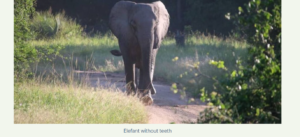News . Best Practices A journey into evolution with the help of elephants’ tusks

This good practice presents an open schooling education initiative for Connect, developed by Protypo High School of Heraklion and teacher Maria Eleftheriou from 19/11/2021 to 23/05/2022. Two scientists participated in the activities, Dr. Anastasios Pavlopoulos Biologist from the Biology Department of FORTH (Foundation of Research and Technology) and Dr. Iasmi Stathi Biologist from the Biology Department of the University of Crete and the Natural History Museum of Crete. It was supported by Dr. Giorgos Panselinas, coordinator of the Connect program of the Regional Directorate of Crete and school counselor. This practice was previously presented HERE
Care: The students were interested in a real problem, which is how elephants lose their tusks and cannot attack or defend themselves in the environment they live in. This problem was said among others and the students voted it as the most interesting for further study and research. Twenty-two students participated in the activities. The students were 13-14 years old and attend 2nd grade of High School.
Know: The students used knowledge of Biology and in particular topics of natural selection and evolution. The skills students practiced were collaboration and communication, critical thinking, question processing, discussion, digital literacy, creativity and reasoning.
Do: At the end, the students prepared a game, presentations, interviews, interactive map, experiments and a storymap. They completed the activities as a group or individually, supported by their families. Conclusions on Open Schooling: The activity was integrated into the curriculum. The activity was innovative because for the first time the students were asked what problems they had heard or experienced and really wanted to deal with. For this reason, the students discussed in plenary after they had also discussed with their families and voted for what they considered the most interesting topic. Open schooling can be useful but also challenging for teachers and teachers because they are usually involved in problems outside the standard curriculum such as climate change etc.
The change/innovation was supported by:
[ x ] School management [ x ] school association/network [] Local government [ ] Other: ________________________________
Student results: The students were participative, interested from the beginning to the end of the project. They got in touch with their parents and relatives to ask them questions and get interviews. They worked as a team and through communication they achieved tangible results. They played a game that they created themselves and that was related to the topic of the project. They made presentations on various related topics. A group of students presented the work of all the students at a student conference organized by the Regional Directorate of Crete.
This practice contributed to the increase of:
[ x ] engaging families with sciences [] involving girls in science [ x ] raising awareness among students about careers in the natural sciences
Please specify: A seemingly “innocent” and “irrelevant” observation a student had about a population of elephants raised many questions for the students to investigate and discuss with the appropriate scientists. The families were interviewed at the beginning of the project but also during it in order to give their own opinions and some due to profession were interviewed through an interview by the students themselves. Students became aware of the environment and climate change.